
Guests
- Bill Moyersacclaimed broadcast journalist who died June 26, 2025, at age 91.
The legendary journalist Bill Moyers has died at the age of 91. Moyers, whose long career included helping found the Peace Corps and serving as press secretary for President Lyndon Johnson, was an award-winning champion of public television and independent media. We feature one of his numerous interviews on Democracy Now!, where we discussed the history of public broadcasting in the United States and the powerful role of money in corporate media. “The power of money trumps the power of democracy today, and I’m very worried about it,” he said in a 2011 interview. His comments hold particular resonance as the Trump administration moves to strip federal funding from PBS and NPR today.
Transcript
AMY GOODMAN: This is Democracy Now!, democracynow.org. I’m Amy Goodman.
The legendary journalist Bill Moyers has died at the age of 91. In the ’60s, he was a founding organizer of the Peace Corps, served as press secretary for President Lyndon Johnson, in 1971 began an award-winning career as a TV broadcaster that would last for over 40 years. During that time, Bill Moyers received over 30 Emmys, countless other prizes, many for his programs on PBS, also a longtime champion of public television and independent media, his death coming at a time when the Trump administration is moving to strip federal funding from PBS and NPR.
In 2011, Juan González and I interviewed Bill Moyers. He outlined his critique of the corporate media.
BILL MOYERS: Well, the consensual seduction of the mainstream media by and with the government is one of the most dangerous toxins at work in America today. They wouldn’t see it this way, and there are exceptions, but the corruption of corporate media, corporate power and government is what makes so vital what the two of you do. I’m serious about that. You don’t have the scope of Meet the Press. I mean, look at Meet the Press. Who’s been on Meet the Press more than any other figure in Washington in the last several years? Newt Gingrich. Newt Gingrich. Newt Gingrich, I later learned, when I was briefly at NBC as an analyst doing commentaries, controversial commentaries, actually came to the brass of NBC and GE. Newt Gingrich has had some nefarious relationship with General Electric, which is one of the huge government contractors, as well as the owner of Meet the Press. And it’s just an example of what I’m talking about. The consensual seduction of the mainstream media with power, corporate power, government power — with exceptions, I repeat — is something that, without the antidote of independent reporting and analysis that you do and others, we would be in — we would be in a dark, dark pit with no light shining on us.
AMY GOODMAN: I want to go back, since we’re talking about broadcasting, right back to the Johnson era and then jump back to here, which is about the founding of public broadcasting and the Corporation for Public Broadcasting, especially for young people, to understand why it began and where it’s gone.
BILL MOYERS: Well, there were — believe it or not, I mean, nobody below 40 will believe this. You may not believe it, because both of you are much younger than I am. But when I was 20 years old, there were three networks: ABC, CBS and NBC. And ABC was only half a network — no news division, all of that. And so, we were dependent upon three corporate, advertising-driven, commercial networks for our information. And to his credit, Lyndon Johnson, who made his fortune, part of his fortune, by controlling the three — he had one station in Austin that had a monopoly over broadcasting the product, the content, of all three networks. I mean, that’s how he made his money, much of his money. But he really did believe — he was a teacher. He had taught poor Mexican students in the little town of Cotulla, Texas. He was a populist, from a poor part of Central Texas —
JUAN GONZÁLEZ: South Texas.
BILL MOYERS: Yeah, but he went to South Texas. He came from Central Texas, went to South Texas to teach in this Mexican school. And he really cared about the poor, and he cared about education. He felt there should be one channel that was free of commercials and free of commercial values, because he knew what commercial values will do to people who are reporting the news, producing content. The desire to amuse and entertain will cause us to compromise the truth.
So he — when the Carnegie Corporation and the Carnegie Commission — John Gardner had been head of the Carnegie Corporation — and they did a study of what to do about educational television in this country. The report was actually delivered to my desk when I was still at the White House. The Carnegie Commission became the Public Broadcasting Act of 1967. And I wish we had it here, because the speech Lyndon Johnson made when he signed the Public Broadcasting Act of 1967 is a great tribute to a network devoted to the life of the mind, the life of the spirit, and the diversity of American voices. He believed that only white male straight guys got on national television in those days, and he was right. And he saw the value, the changing — the changes coming in America, and he believed there should be a public media that was devoted to the diversity, the pluralism of American life, and to the highest expression of the creative and journalistic arts in this country.
JUAN GONZÁLEZ: And the actual act of the — creating the Corporation for Public Television, talked about serving underserved —
BILL MOYERS: Yeah.
JUAN GONZÁLEZ: — communities of America.
BILL MOYERS: And unfortunately, as you’ve probably noticed, that there was a report done by Fairness and Accuracy in Media, a public interest group —
AMY GOODMAN: In Reporting.
BILL MOYERS: Yeah, Fairness and Accuracy in Reporting, right?
AMY GOODMAN: FAIR, right.
BILL MOYERS: FAIR. And they showed that even on public broadcasting today, in our mainstream broadcasts, it’s usually the official view of reality that’s represented, far more corporate spokesmen than labor or working people spokesmen, far more white, male figures of authority than people of color and marginalized people. That’s just a tendency of human beings that always has to be resisted. And public television, public radio belongs to the people. Go back and read a great document, the Public Broadcasting Act of 1967. And when we stray from it, as we sometimes do, the public has to rise up and say, “We own you. We are your shareholders. Come back to first principles. Come back to first things.”
AMY GOODMAN: So, what has happened to public broadcasting right now, the onslaught? You talk about — you just wrote a piece about NPR and PBS, and you talk about, well, Nixon first tried to gut it, and then take it forward.
BILL MOYERS: Richard Nixon tried to — tried to — he did succeed in fragmenting our authority, because he didn’t like — I was on the air. Robert MacNeil was on the air. We were doing journalists’ work, but he called us liberals because we were trying to get at the facts. He and Pat Buchanan, his communications director, succeeded in harming, injuring public broadcasting back in the 1970s. Thanks to a great Republican who was chairman of the public television station in Dallas, we beat him off. They wanted to defund us completely, but they didn’t. Then Newt Gingrich comes — Robert Dole comes along with the right wing in the late ’80s, and he tries to defund public broadcasting. Then comes Newt Gingrich in 1994, and now — then we had George W. Bush and his team, who came after some of us on public broadcasting.
Conservatives, on principle, don’t believe that federal funds should be used to support the media. But then also, they don’t believe in allowing any alternative voices, any alternatives to the official view of reality, to be heard. So they have always been against public broadcasting.
And sometimes self-censorship occurs because you’re looking over your shoulder, and you think, well, if I do this story or that story, it will hurt public broadcasting. Public broadcasting has suffered often for my sins, reporting stories the officials don’t want reported. And today, only about seven — you know, a very small percentage of funding for NPR and PBS comes from the government. But that accounts for a concentration of pressure and self-censorship. And only when we get a trust fund, only when the public figures out how to support us independently of a federal treasury, will we flourish as an independent medium.
JUAN GONZÁLEZ: Are you hopeful these days, despite the — what we discussed about the state of the media? We’re obviously seeing these enormous uprisings throughout the Arab world. On Democracy Now!, we’ve covered the — really, the democratic popular renaissance that’s occurred throughout all of Latin America in recent years, that there are parts of the world where things are hopeful. But right here at home, in the United States, things don’t always seem like they’re heading in a good direction.
BILL MOYERS: I think this country is in a very precarious state at the moment. I think, as I say, the escalating, accumulating power of organized wealth is snuffing out everything public, whether it’s public broadcasting, public schools, public unions, public parks, public highways. Everything public has been under assault since the late 1970s, the early years of the Reagan administration, because there is a philosophy that’s been extant in America for a long time that anything public is less desirable than private.
And I think we’re at a very critical moment in the equilibrium. No society, no human being, can survive without balance, without equilibrium. Nothing in excess, the ancient Greeks said. And Madison, one of the great founders, one of the great framers of our Constitution, built equilibrium into our system. We don’t have equilibrium now. The power of money trumps the power of democracy today, and I’m very worried about it. I said to — and if we don’t address this, if we don’t get a handle on what we were talking about — money in politics — and find a way to thwart it, tame it, we’re in — democracy should be a brake on unbridled greed and power, because capitalism, capital, like a fire, can turn from a servant, a good servant, into an evil master. And democracy is the brake on my passions and my appetites and your greed and your wealth. And we have to get that equilibrium back.
I said to a friend of mine on Wall Street, “How do you feel about the market?” He said, “Well, I’m not — I’m optimistic.” And I said, “Why do you, then, look so worried?” And he said, “Because I’m not sure my optimism is justified.” And I feel that way. So I fall back on the balance we owe in a — in the Italian political scientist, Gramsci, who said that he practices the pessimism of the mind and the optimism of the will. By that, he meant he sees the world as it is, without rose-colored glasses, as I try to do as a journalist. I see what’s there. That will make you pessimistic. But then you have to exercise your will optimistically, believing that each of us singly, and all of us collectively, can be an agent of change. And I have to get up every morning and imagine a more confident future, and then try to do something that day to help bring it about.
AMY GOODMAN: The legendary Bill Moyers in 2011. He’s died at the age of 91. Deepest condolences to his family. I’m Amy Goodman.

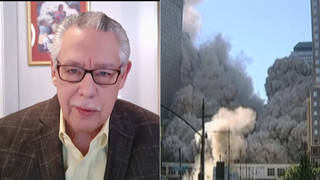
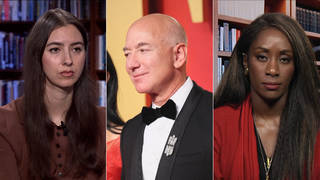
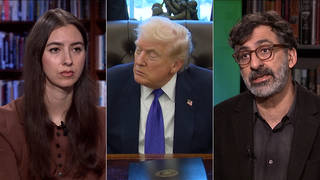
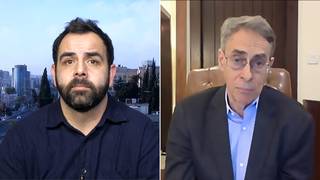





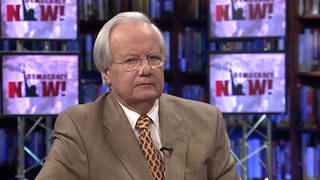

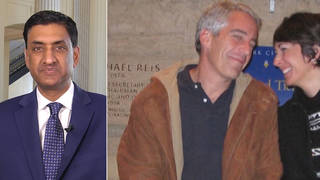
Media Options